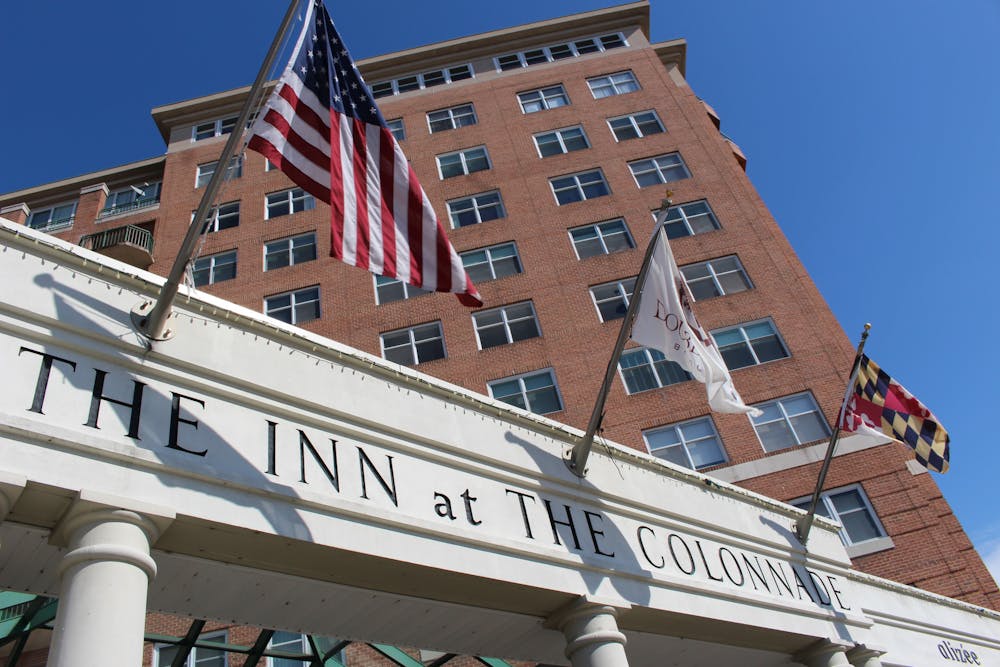Throughout the hybrid spring semester, Hopkins has established isolation and quarantine housing for students who test positive for COVID-19 or come into close contact with someone who tested positive. There are currently 343 rooms reserved for this purpose at AMR III, the McCoy Hall, the Inn at the Colonnade and an additional Hopkins-owned property.
Isolation housing is used for COVID-19-positive students, while quarantine housing is for those who have had a meaningful contact with a person who tested positive. As of Friday, both isolation and quarantine housing are largely empty, with seven isolation housing units in use.
According to Assistant Vice President of External Relations for the Office of Communications Karen Lancaster, students who test positive will receive a call from a HelWell nurse with instructions to relocate. The nurse will regularly follow up on physical and emotional health until the end of the isolation period.
Similar processes occur for those who need to move to quarantine housing.
Freshman Christopher Xiao lived in quarantine housing at the Inn at the Colonnade last week. Xiao wishes that the University would improve its communications with those who have to move into quarantine housing.
“I was only informed that I had been in close contact by one of my suitemates. If they had not informed me, then I don’t know how long it would have taken for HelWell to call me,” he said. “I’m very thankful that he did because it sped up the process a lot for getting me identified and getting me to a safer space.”
Freshman Jacob Paikin was also in quarantine housing at the hotel last week. He believes that the University should give more time for students to relocate.
“I do know instances where people have been rushed to pack and have forgotten things,” he said. “It would be preferable for the University to have a bit more warning for sending people there.”
Hopkins has had a contractual relationship with the Inn at the Colonnade for over six years, according to Lancaster, and 125 rooms are available to the University at a “significant discount” throughout this semester. A standard room typically costs over $150 a night at market rate.
The hotel provides visitors with amenities, including wifi, room service and laundry. HelWell has a designated space in the Inn at the Colonnade where medical providers are present during business hours for any necessary on-site care.
Paikin described the living arrangements at the Inn at the Colonnade as satisfactory.
“[The room] is relatively spacious, certainly bigger than a dorm room,” he said. “They have complimentary room service as well, which makes things a little convenient for getting food. It’s all very clean, although they can’t come in to clean it for you, which is a little annoying, but alright.”
Students do not have access to cleaning service while at the hotel. Rooms are cleaned by the hotel staff in between student check-ins.
Xiao reported that he did not come into direct contact with any of the hotel staff.
“If you order food, they will put it outside your door, and they will ring your telephone and knock,” he said. “You’re supposed to wait for one to two minutes for them to vacate the area, then open the door and grab it.”
Freshman Elaina Regier, who was in isolation housing at the Inn at the Colonnade, did not enjoy the room service at the hotel.
“Of the few food options I liked, I got tired of eating them really quickly. My suitemate is vegetarian, and there were few vegetarian options and even fewer vegan options,” she said. “By the second half of isolation, I was just ordering outside food to be delivered because it was easier and better than the room service.”
There was also no in-unit microwaves, so Regier could not heat up the food she brought with her from her dorm. She believes Hopkins should make changes to the dining operations at isolation and quarantine housing.
“Some other schools are giving students a budget to spend on getting outside food delivered. That could be a really good option for Hopkins,“ she said. “At the very least, students should be given a microwave, especially because we were told we would have one when given instructions for packing.”
Students are able to order from the room service offerings prepared by the Alizee, a restaurant at the first floor of the Inn at the Colonnade. The menu ranges from chicken wings and veggie bowls to pasta Alfredo and angus burger. According to a copy of the menu obtained by The News-Letter, there are five vegetarian and two vegan menu items.
Lancaster stated that the the hotel has been accommodating various dining needs of students.
“The Colonnade can help with reheating food or any other needs by calling the kitchen,” she wrote. “For students with dietary issues or allergens that may require a microwave, the Colonnade can accommodate. The Colonnade has a full menu with close to 50 items for students to choose from.”
Students in quarantine housing are tested three times a week, similar to other students living in Baltimore this semester.
According to Xiao, testing was the only occasion when he interacted in-person with University or hotel staff.
“One of the HelWell nurses will come. They’ll email us before the expected time. When they come, they’ll be wearing a mask, face shield, all the [personal protective equipment] necessary to protect them,” he said.
The University’s Counseling Center also hosts weekly virtual drop-in groups for students in isolation and quarantine.
Xiao recounted trying to make the experience in quarantine housing as normal as he could.
“After dinner, I take advantage of the fact that they have a lot of channels on TV: hockey, football, basketball, whatever. There’s ample space if you want to do body weight exercises, so I try and do some of that if I can,“ he said. “I definitely am looking forward to seeing a lot of my classmates in a socially distanced manner.”





